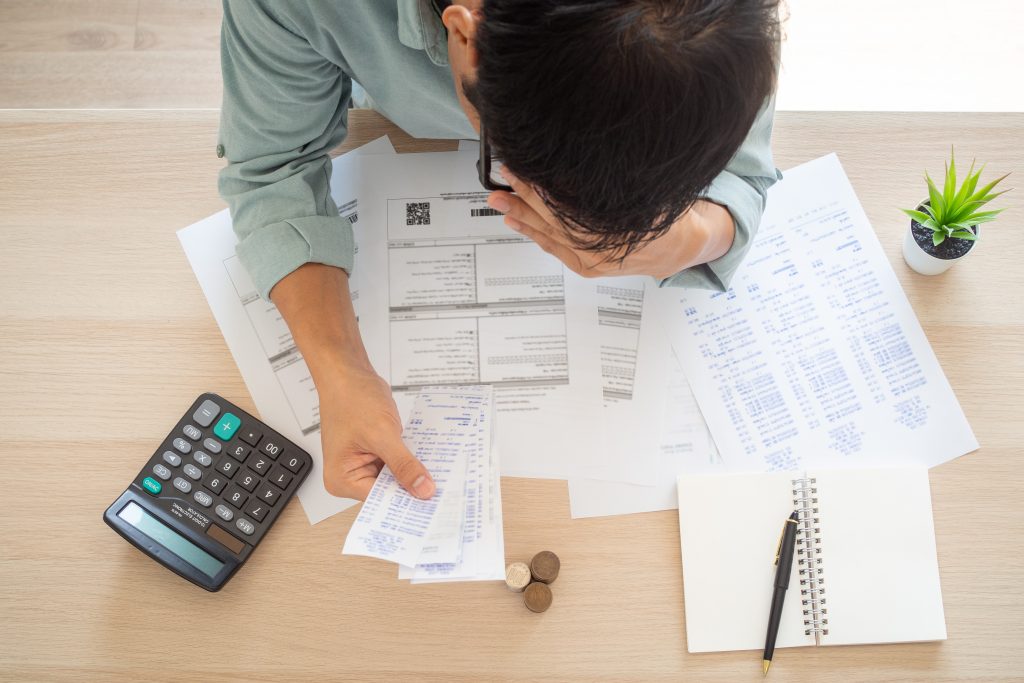Just because you have a substantial level of unsecured personal debts doesn’t necessarily mean that you are insolvent. For a start you may have a good income and sufficient disposable income to easily make the contractual payments on your loan agreements. Alternatively, while you may have low income and little or no disposable income, if you have saleable assets such as a house in which there is substantial equity, you may not have a problem. Provided you are willing to sell your property or to re-mortgage it to release equity, your financial problems can be addressed.
If you have both a good income and substantial equity in your assets, hopefully you are solvent.

If however you are insolvent, there are two principal statutory solutions available. These are Bankruptcy and an Individual Voluntary Arrangement (IVA). The word ‘statutory’ simply means that the solution is governed by the law of the land i.e. England, Wales or Northern Ireland. The law in Scotland is slightly different in relation to insolvency. Your personal circumstances will largely determine whether an IVA or Bankruptcy is best for you.If you are not insolvent you can enter into an informal agreement with your creditors via a Debt Management Plan, either self-administered or with the help of a commercial Debt Management company or a free service organisation such as Stepchange, Pay Plan or CAB.Assuming that you are insolvent and an insolvency professional can quickly verify this for you, you will need to consider your options. Whether you enter into an IVA or petition for Bankruptcy, you will naturally be concerned at the long term damage to your credit worthiness.
Declaring that you are unable to pay your debts as they fall due and that you are insolvent triggers the posting of credit defaults on your credit files once creditors become aware of your insolvency. They use the services of credit reference agencies such as Experian, Equifax and Callcredit which keep and maintain records of the repayment performance of borrowers. The business of these agencies is to record such data on the credit files of borrowers and sell it to any interested party, provided they have a consumer credit license.
This is how banks, mortgage providers, HP providers, credit card providers and even trading creditors can access your financial records in regard to borrowings. If you have a good credit history, then these records can facilitate your further borrowing at preferential rates. The converse is also true. A poor credit history will increase the cost of borrowing or even make it impossible. Access to and publication of such personal financial data relating to insolvent individuals is not prohibited by the Data Protection Act. For a small fee you or any private individual can obtain his or her own credit file and, in certain instances, a private individual can access the credit file of another individual such as when the two individuals concerned are co-habiting or even just living in the same house.
When you default in repaying any of your borrowings, creditors can create records of your failure. They do this by registering a default on the relevant account and provide the relevant information to the credit reference agencies. Even prior to an IVA or Bankruptcy, some of your creditors may already have registered such a default where you have failed to comply with the terms and conditions of credit agreements, principally when you fail to make contractual repayments as they fall due. Such records are also accessible by the parties mentioned above. In an IVA and in Bankruptcy, defaults remain on your credit file for six years from their date of registration. In an IVA of five years duration, borrowers can expect the default to be removed from their credit file about one year after completion of the IVA, assuming the defaults were registered around the time the IVA commenced. In Bankruptcy, the defaults will usually be removed about five years after discharge from bankruptcy which nowadays usually lasts one year.
In an IVA, you will not be allowed to access credit without the express permission of the supervisor and creditors and similarly in Bankruptcy, your trustee controls you in this regard. You may be allowed to retain a current account, without overdraft facilities. In considering any request for credit facilities following the successful completion of your IVA or Bankruptcy, creditors will naturally check on your credit history via the credit files and will generally refuse credit if the credit files still carry default records. However, six years from the dates of the defaults, the credit reference agencies should automatically update the credit files and remove all references to defaults. If this has not been done, you can request the credit reference agencies to do so. If creditors refuse or fail to do so and in the absence of a satisfactory response from them, you can invoke their complaints procedures to deal with the matter and so begin to repair your damaged credit rating.
If applying for credit following an IVA or Bankruptcy, do not lie on the application form, whether it’s for a mortgage, a credit card or any other loan facility. Even if your credit file is clear, the application form may ask: ‘have you ever entered into an arrangement with creditors?’ Tempting as it might be, it is better to take your chances and rely on the truth and on your successful completion of your IVA or Bankruptcy to convince your loan provider to lend to you than to risk being charged with fraud at some time in the future, having been fraudulently approved for the loan.